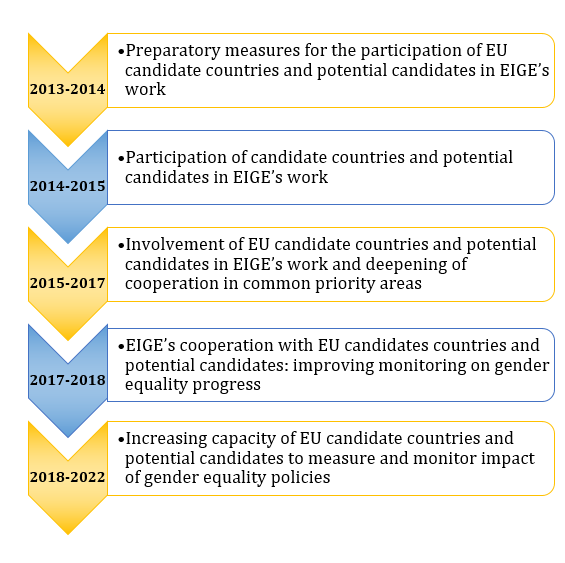Who do we work with?
Within this project, EIGE works with the following EU candidate countries and potential candidates: Albania, Bosnia and Herzegovina, North Macedonia, Kosovo*, Montenegro, Serbia, and Türkiye.
The main governmental cooperation partners are the national bodies responsible for gender equality policies and national statistical offices.
Other important non-governmental stakeholders are civil society, academia, gender equality experts and journalists.
EIGE can also join up with national parliaments, other ministries and institutions, gender equality experts and others, who may indirectly benefit from our cooperation.
To make the most of EIGE’s synergies with other EU institutions, cooperation is coordinated with:
- Directorate-General for Neighbourhood and Enlargement Negotiations (DG NEAR);
- Directorate-General for Justice, Consumers and Equality (DG JUST);
- European External Action Service (EEAS);
- EU Delegations in the region.
EIGE also works in cooperation with international organisations including:
- UN WOMEN and United Nations Populations Fund (UNFPA) Regional Offices for Europe and Central Asia;
- Other relevant organisations with regional presence.
Principles of co-operation
- Transparency: EIGE’s cooperation with EU candidate countries and potential candidates is transparent and inclusive. EIGE shares information through its regular communication channels.
- Country driven approach: The initiative for cooperation must come from the EU candidate countries or potential candidates with strong political commitment. For example, EIGE may support those that have expressed interest in developing a national Gender Equality Index.
- Expertise: EIGE provides expert support, such as knowledge on data collection on gender-based violence.
How do we work?
We have identified several ways to bring gender equality forward in the region of the Western Balkans and Türkiye and to make use of the work done for the EU Member States. Here are a few examples of how we work:
- Foster regional cooperation and peer-learning;
- Support the development of national Gender Equality Indices;
- Include data from the region on Women and Men in Decision Making into EIGE’s Gender Statistics Database;
- Share EIGE’s methods and tools on gender mainstreaming;
- Inform on EIGE’s work on combating gender-based violence;
- Support work on gender-sensitive language through EIGE’s tools (such as the Gender Equality Glossary and Thesaurus; gender-sensitive communication toolkit)
- Promote examples of gender equality initiatives in the region.
Why this project?
The European Union has a special programme for supporting candidate countries and potential candidates seeking to become members of the EU and who are already in the process of EU accession or negotiation. The programme is called the Instrument for Pre-accession Assistance (IPA) and is managed by the Directorate-General for Neighbourhood and Enlargement Negotiations (DG NEAR). Funds from the IPA programme are used for supporting the Western Balkans and Türkiye to implement necessary political and economic reforms before they can join the European Union.
As gender equality is one of the key principles of the European Union, EIGE works with EU candidate countries and potential candidates to build their capacity in this area within the IPA programme.
Cycles of EIGE’s cooperation with EU candidate countries and potential candidates

Contact information
For more information on the IPA project, please contact:
Živile Macijauskienė, +370 5 2157 416, zivile.macijauskiene@eige.europa.eu
*This designation is without prejudice to positions on status, and is in line with UNSCR 1244 and the ICJ Opinion on the Kosovo Declaration of Independence.